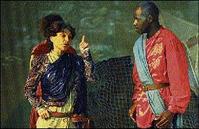Mel Cooke, Freelance Writer
Caliban plots his revenge - Nathaniel Stewart/Freelance Photographer

Alonzo (left) and Gonzalo consult each other
The University Players' production of Aime Cesaire's A Tempest, which wraps up at the Philip Sherlock Centre for the Creative Arts, UWI, Mona, this evening, is simply superb.
With the playwright dying in Martinique a month before the play opened, it was natural that the production, directed by Brian Heap, be dedicated to him, and it is a fitting one.
The story, an adaptation of Shakespeare's The Tempest, is well known - a domineering castaway (deliberately) nobleman with sorcerer's powers, Prospero (played by Rooney Chambers), engineering a ship with those who wronged into the same fate. Chief among them are Ferdinand (Jean-Paul Menou) and Alonso (Hilary Nicholson, who does a good gender switch to play a goddess), who joins Prospero, Caliban (Chris McFarlane), Ariel (Nadean Rawlins) and the non-speaking, occasionally humorous Spirits (Dane Richardson and Mark Grey). Then there are the bumbling drunkards Stephano and Trinculo (Melward Morris and O'Neil Peart, respectively) and the plotters Antonio (Andre Robinson) and Sebastian (Noelle Kerr).
The play works through Prospero's machinations for revenge in two acts, climaxing with the final confrontation and its aftermath.
So after an excellent beginning before the beginning, so to speak, where the players come on-stage yawning to be appointed their roles and costumes by the MC (Denara Karamath, who quadruples up, Botswain being among her other roles), A Tempest proper opens with deckhands on the doomed ship, a storm, holding on to ropes as the wind howls.
From there it moves to, naturally, the island.

Prospero (left) gives Ariel instructions, as the Spirits keep watch.
examination of colonialism
In reworking The Tempest, Cesaire turned it into an examination of colonialism and in this staging the cast is colour correct. So while the upper echelons of those who came to the island (notably save for Gonzalo, played by Canute Fagan) are very pale Caliban and Ariel are of darker hue. And the frictions caused by slavery/colonialism play out not only between Prospero and Caliban, but also Caliban and Ariel, who wage the age-old battle of the approach to gaining freedom. Caliban takes the path of maximum resistance, Ariel the path of least, with the inevitable betrayal being ably played out.

Prospero (left) and Miranda in "A Tempest"
The difference between the races and classes is also demonstrated in language, the contrast between Prospero's deliberate English and Caliban's patois striking.
The main roles are very well done, Prospero sneering down his 'hook' nose (as Caliban describes it), Miranda a flittering airhead, Caliban sitting at top of one set of steps leading underneath the stage, smoke rising around him, as he growls his resistance, Ariel undulating her limbs in her fairy's fury.
The other roles are also competently executed, though the drunkards' bumbling and the aristocrats' forays on the island generally require less of the players.
Stephano makes good as a self-effacing, hesitant youngster. Fagan, when he switches from Gonzalo to Eshu, is an engaging, prancing, troublesome figure, whipping a sausage balloon from his baggy trousers and chasing the squealing goddesses.
The set is simple enough, the ropes of the ship giving way to a black and white checked square, turned to become a diamond to the audience on which three white boxes which serve as obstacles to Caliban's efforts to overthrow Prospero by force, the MCs pedestal from which to allocate roles and the elevated position for the dominant player (often Prospero) at some moments.
de facto god
To the rear of the stage is the shipwreck, an organised jumble of wood.
In the end, what is played out in A Tempest is the island which the coloniser dominated coming to be his only refuge and, eventually, the site of his overthrow. As Caliban predicted, after Prospero engineered the marriage of his daughter to the son of his enemy and displayed his magnanimity by allowing all to return to 'civilisation', he cannot leave the place where he is de facto god.
And, when only they are left on stage, Prospero becomes a huddled figure, as Caliban fills in the white squares closest to the audience with black tiles.
It is a pointed, powerful and poignant end to a very good production.

